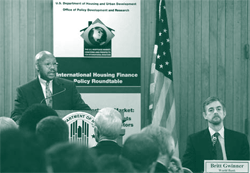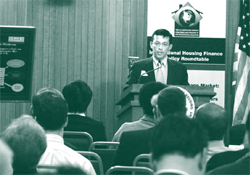February 2008
In this Issue
A National Crisis with Global Impact
Secondary Mortgage Markets: Increasing Capital and Improving Housing Affordability
Waiting for Technology: A Research Agenda
Which Type of House Would You Buy?
In the next issue of ResearchWorks
A National Crisis with Global Impact
At our headquarters in the nation’s capital, HUD’s Office of Policy Development and Research (PD&R) recently assembled a panel of experts in international housing finance for a roundtable discussion of the subprime mortgage crisis. Moderated by Britt Gwinner, Lead Housing Finance Specialist for the World Bank, participants provided a global perspective on current and future prospects of the mortgage market and rising foreclosure rates in the United States. Panel participants included David Chow of the China Development Financial Holding Corporation of Taiwan, Alan Elizondo of Mexico’s Sociedad Hipotecaria Federal, Gregory Ingram from the Lincoln Institute of Land Policy, and Allen Frankel, a consultant with the Bank for International Settlements.

Secretary Alfonso Jackson convened this roundtable to examine global implications of the housing market slowdown and rising foreclosure rate. In his opening remarks, the Secretary observed that the subprime market is “not just a housing issue, but an economic issue. The housing crunch affects consumers, banks, credit markets, and job creation throughout the world.”
To frame the dialogue, Moderator Gwinner noted that although the U.S. subprime market is relatively small in the larger scope of international housing finance, the ripple effect of the subprime crisis is significant. It focuses worldwide attention on what went wrong, how the crisis can be resolved, and how to safeguard markets by preventing a recurrence. Mr. Gwinner suggested that some of the basic causes of the crisis appear to be both classic and avoidable (such as the lack of thorough due diligence on the part of investors), but other elements were unexpected and need to be better understood. Since developing nations have traditionally turned to wealthy nations for models when building their housing finance markets, analyzing the present crisis is of particular interest to the developing sector.
In exploring what led to the present crisis, discussants identified some contributing developments of the last 10 to 20 years:
-
Declining international capital markets’ real interest rates;
-
Investor dissatisfaction with low returns, prompting development of potentially volatile new products with higher yields and greater risks;
-
Rising home prices, stimulated by a combination of low interest rates, income growth, and competition;
-
Demand by U.S. households for residential mortgage credit, stimulated by these lower interest rates;
-
Rising rate of construction costs that exceeded income growth, both of which were surpassed by a sharp increase in land prices; and
-
Restrictive land use regulations that fueled soaring housing prices and the demand for subprime loans.
These conditions form the backdrop for the now evident — and unfortunate — consequences of combining higher risk financial products and lower mortgage underwriting standards. Outcomes resulting from a lack of foresight, insufficient due diligence, and fragmented regulation include a global capital market at risk, an opaque and uneven flow of information between buyers and sellers, disillusioned foreign investors, and a reduced demand for U.S.-based securities. Income growth in developing countries has slowed and the U.S. economy is experiencing the effects of discrepancies in rates of spending, perceived wealth, and income growth. In tandem with higher borrowing costs, these conditions jeopardize a balanced flow of international capital. The resulting distortion and contagion in global markets is leading central bankers to regard this as a major crisis; one that encourages them to play a larger role in guiding housing markets.
What Now?
Proposed remedies for resolving the crisis and safeguarding future markets revolve around some modification of U.S. mortgage institutions to improve due diligence, regulatory oversight, and risk management activities. First, it was suggested that consideration be given to strengthening loan origination standards. It was recommended that mortgage contracts to nonprime borrowers be kept simple, that full disclosure to borrowers be required, and that borrowers qualify for credit at the fully phased-in interest rate, rather than an introductory teaser rate. It was also suggested that the U.S. reexamine incentives that shape behavior in the mortgage market. For example, any incentives that encourage reliance on fraudulent appraisals should be eliminated, while incentives to monitor the quality of assets behind securitized loans would be appropriate.
Second, regulators would benefit from a better grasp of the market practices of banks, securities firms, and insurance companies. One participant observed that the U.S. regulatory system appears to be too fragmented, a condition that gives rise to loopholes and incomplete regulation. Discussants saw the need for enough of “the right kind of regulation,” consistently monitored throughout the life of a mortgage. Third, there was concern that the subprime market disburses risk too quickly, which tends to diminish international investors’ confidence in the U.S. housing finance system. Requiring banks that make mortgage loans and sell them off as securities to retain a portion of the risk was one recommendation. It was further suggested that the U.S. look at models using covered bonds, wherein a financial institution backs the provision of credit.
Ultimately, participants emphasized that borrowers and investors want transparency and reforms in housing finance that will reduce uncertainties and promote housing affordability and economic prosperity throughout the world. A webcast of the PD&R-sponsored International Housing Finance Policy Roundtable is available to viewers at www.huduser.gov/resources/webcast.html.
| HUD has taken steps to help qualified homeowners avoid foreclosure. Further information is available at www.huduser.gov/whatsnew/intlhsgfin.html. |

